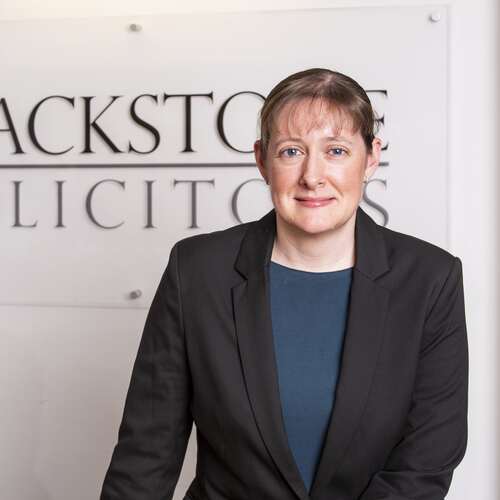Setting Up Trusts
The Succession Planning team at Blackstone Solicitors is here to help you protect your interests and to provide the all-important peace of mind that everything will be taken care of as you wish when you pass away. Planning ahead is essential, and we can assist you with every aspect of succession planning to make sure that you’re fully prepared for the future. Part of the planning process can involve setting up a Trust.
Contact us today and we can talk you through our services and how we can help you and your family. Simply call us on 0345 901 0445 or complete our online enquiry form and a member of the team will give you a call back as soon as possible.
At Blackstone, we always aim to provide the best service possible. Meticulous in our approach, we will make sure everything is dealt with as you wish and will keep you updated throughout the legal process, ensuring that you always know of any developments.
![]()
“I received very good service and advice, given to me on a week by week basis. I would strongly recommend Blackstone.”
– Paul 
Our Services
We can provide help with a wide range of matters relating to Succession Planning, including:
- Director Lasting Power Of Attorney
- Partnership agreements
- Shareholder Agreements
- Amends To Articles Of Association
- Making a Will
- Setting up Trusts
- Lifetime Giving
- Charitable gifts and trusts
- Protection from care home fees
- Setting up a Lasting Power of Attorney
- Setting up a Health and Welfare Lasting Power of Attorney
- Setting up a Property and Financial Lasting Power of Attorney
We have partners we work closely with that can advise upon:
- Tax Planning including advising on capital gains tax and income tax for individuals, businesses, landed estates, professionals, entrepreneurs and advice on matters including business relief, exemptions and retirement planning.
What Are trusts
At Blackstone Solicitors, we understand that setting up a trust can be an essential step in managing and protecting your assets. Trusts offer a flexible and effective way to manage wealth, plan for the future, and ensure that your estate is distributed according to your wishes. Whether you are looking to provide for loved ones, protect assets, or manage tax liabilities, understanding the different types of trusts available is crucial.
- Bare Trusts
A Bare Trust, also known as a Simple Trust, is the most straightforward type of trust. In a Bare Trust, the beneficiaries are immediately and absolutely entitled to both the capital and income of the trust. The trustee’s role is to hold the assets and manage them until the beneficiary is ready to receive them. This type of trust is often used to pass assets to young beneficiaries, such as children or grandchildren, until they reach a certain age.
Key Characteristics:
- Beneficiaries have an absolute right to the assets.
- The trust does not allow for flexibility once it is set up.
- Beneficiaries must be over 18 to claim their assets.
- Discretionary Trusts
Discretionary Trusts provide trustees with the power to decide how to distribute the trust’s income and capital among the beneficiaries. The settlor (the person creating the trust) usually provides guidance on how the trust should be managed, but the trustees retain discretion over the distribution.
This type of trust is particularly useful for providing flexibility in how and when beneficiaries receive their inheritance. It can also be advantageous in protecting assets from creditors or in managing the beneficiaries’ tax liabilities.
Key Characteristics:
- Trustees have discretion over distributions.
- Beneficiaries do not have an automatic right to the trust’s assets.
- Can be used for tax planning and asset protection.
- Interest in Possession Trusts
An Interest in Possession Trust gives a named beneficiary the right to receive income from the trust’s assets during their lifetime. However, the capital remains within the trust and will ultimately pass to other beneficiaries upon the death of the income beneficiary. These trusts are often used to provide for a surviving spouse while ensuring that the capital is preserved for children or other family members.
Key Characteristics:
- The income beneficiary has a right to the income generated by the trust.
- The capital remains within the trust and passes to other beneficiaries later.
- Commonly used in estate planning to provide for different generations.
- Accumulation and Maintenance Trusts
Accumulation and Maintenance Trusts are designed to provide for children or young people until they reach a certain age, typically 18 or 25. During the trust’s term, the income generated by the trust can either be accumulated within the trust or used for the beneficiary’s maintenance, education, or benefit.
This type of trust is commonly used by parents or grandparents to ensure that funds are available for education or other essential needs.
Key Characteristics:
- Trustees can accumulate income or use it for the beneficiaries’ maintenance.
- Beneficiaries receive the capital once they reach a specified age.
- Ideal for providing for young beneficiaries.
- Trusts for Vulnerable Persons
Trusts for Vulnerable Persons are specifically designed to benefit individuals who are disabled or otherwise vulnerable. These trusts can provide for the beneficiary’s needs without affecting their entitlement to means-tested benefits. The trustees manage the trust assets and ensure they are used in the best interests of the vulnerable person.
These trusts benefit from favourable tax treatment, provided certain conditions are met, making them a valuable tool in planning for the long-term care and support of vulnerable individuals.
Key Characteristics:
- Designed to support individuals with disabilities or vulnerabilities.
- Protects entitlement to means-tested benefits.
- Beneficial tax treatment under specific conditions.
- Charitable Trusts
Charitable Trusts are established for the purpose of supporting charitable activities. The trust must have a recognised charitable purpose, such as advancing education, relieving poverty, or promoting health. As a result, Charitable Trusts benefit from significant tax advantages, including exemptions from income tax, capital gains tax, and inheritance tax.
Setting up a Charitable Trust can be a powerful way to contribute to causes that matter to you while enjoying the associated tax benefits.
Key Characteristics:
- Must be established for a recognised charitable purpose.
- Significant tax advantages.
- Managed to ensure assets are used to further charitable objectives.
- Settlor-Interested Trusts
A Settlor-Interested Trust is a trust where the settlor or their spouse/civil partner can benefit from the trust assets. This type of trust is less common due to the potential tax implications. Income generated by the trust is taxed as if it were the settlor’s own income, which can negate some of the usual tax advantages of a trust.
Key Characteristics:
- The settlor or their spouse/civil partner can benefit from the trust.
- Income is taxed as the settlor’s own income.
- Less common due to tax implications.
Our Approach
We are 100% committed to ensuring each and every one of our clients receives the highest quality service and we will go the extra mile to ensure that you are happy with the results gained. We understand it can be particularly difficult to deal with matters relating to death and inheritance, and this is why our friendly and approachable team always take a sympathetic and understanding approach, ensuring that you receive the support you need.
We believe communication is of the utmost importance. We will therefore keep you updated as things develop and our solicitors will provide practical, straightforward legal advice so that you can be confident everything is progressing as you would like.
Get in Touch
Contact us today to discuss any matter relating to Succession Planning. We can talk about your situation in depth and get to the bottom of what you need and how we can help. We are here to answer any questions which you have, and we aim to make everything as simple for you as possible.
Our team is approachable, professional and vastly experienced. We will do everything in our power to help you get the outcome you need. Call us on 0345 901 0445 or, if you would prefer us to contact you, leave your details via our online enquiry form.
We offer our services to clients in Manchester, Chester, Cheshire and throughout the rest of the UK. We also have an office in London.














